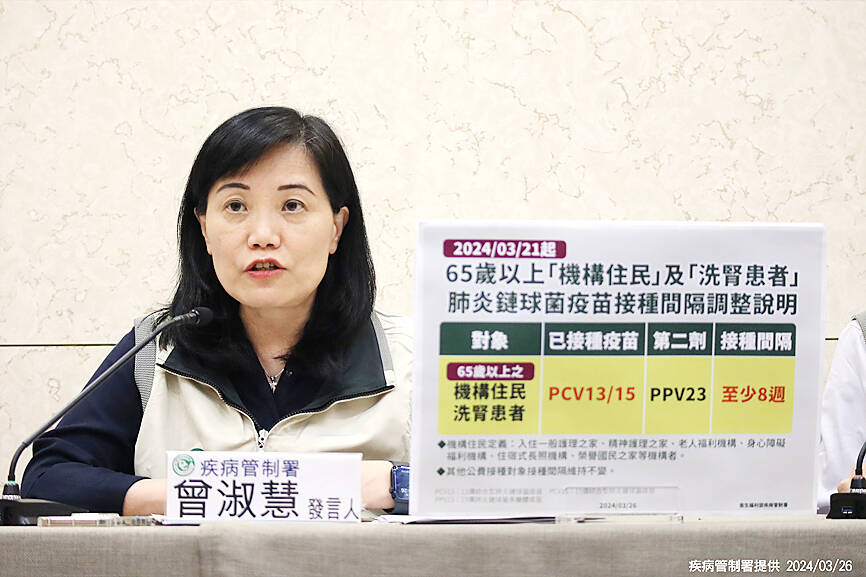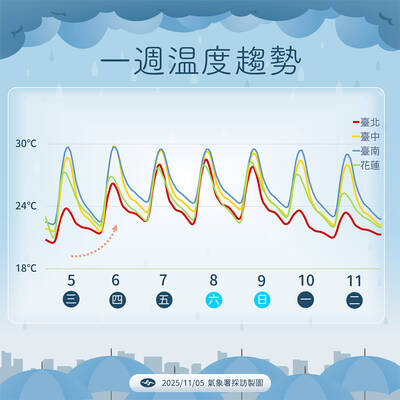Three measles clusters have ended, as no new infections have been detected among close contacts of people diagnosed with the disease, the Centers for Disease Control (CDC) said yesterday, adding that eligibility for the pneumococcal polysaccharide vaccine (PPSV23) has been expanded to two groups of elderly people.
CDC Epidemic Intelligence Center Director Guo Hung-wei (郭宏偉) said that no new measles cases were reported last week, with nine cases — five local and four imported — reported prior to that this year, with three clusters identified.
CDC Deputy Director-General Tseng Shu-hui (曾淑慧) said that as of Sunday, health monitoring of 1,918 close contacts of the people diagnosed with the disease had ended, with no new infections reported among them.

Photo courtesy of the Centers for Disease Control
That indicates the clusters have settled, Tseng said.
However, measles is increasing globally, the CDC said, adding that so far this year, 11 cases have been reported in Japan, 13 in South Korea and 81 in China.
In North America, 64 cases have been reported in the US and at least 40 in Canada, while in Europe, more than 7,000 cases have been reported in Romania, more than 500 in the UK and more than 200 in Austria, exceeding the full-year totals of the past few years, it said.
Moreover, there were 103,000 hospital visits for flu-like illness last week, slightly fewer than the previous week, but it was still the second-highest weekly number for the same week of the year in a decade, Guo said.
Nineteen people had serious flu complications and six flu-related deaths were reported last week, he said.
While flu activity is gradually dropping from a plateau, there are still serious cases being reported, so people should continue to take precautions, Tseng said, adding that expanded eligibility for antivirals would be extended to April 30, allowing people with flu-like symptoms and their close contacts — ie, family members, colleagues and classmates — diagnosed with the flu to receive antiviral drugs.
With 281 people hospitalized with COVID-19 last week, or about 30 percent down from 409 the previous week, COVID-19 activity is also dropping, she said.
Local COVID-19 activity is now in the “yellow” phase and if cases continue to drop for two weeks, it would enter the “green” phase, she said, using a traffic light metaphor.
Meanwhile, eligibility to receive government-funded PPSV23 shots has been expanded following the recommendations of an Advisory Committee on Immunization Practices meeting, Tseng said.
The committee recommended that in addition to high-risk groups, those eligible to receive the PPSV23 shot at least eight weeks after a dose of pneumococcal conjugate vaccine (PCV13) would be expanded to people aged 65 or older if they are residents of care facilities — including nursing homes, psychiatric homes, welfare centers, institutions for people with disabilities, long-term care facilities and veterans’ homes — or undergoing dialysis, she said.
Before the adjustment, elderly people were eligible for a dose of PPSV23 at least one year after a dose of PCV13, unless they were classified as being at high risk from the disease.
The changes would improve protection of elderly people, while about 84,000 people in care facilities and 47,000 people on dialysis would benefit, she said.
As of Sunday, 97 cases of invasive Streptococcus pneumoniae had been reported this year, with 10 people having died, CDC data showed.
Thirty-three percent of the cases were elderly people, the data showed.

Three Taiwanese airlines have prohibited passengers from packing Bluetooth earbuds and their charger cases in checked luggage. EVA Air and Uni Air said that Bluetooth earbuds and charger cases are categorized as portable electronic devices, which should be switched off if they are placed in checked luggage based on international aviation safety regulations. They must not be in standby or sleep mode. However, as charging would continue when earbuds are placed in the charger cases, which would contravene international aviation regulations, their cases must be carried as hand luggage, they said. Tigerair Taiwan said that earbud charger cases are equipped

Foreign travelers entering Taiwan on a short layover via Taiwan Taoyuan International Airport are receiving NT$600 gift vouchers from yesterday, the Tourism Administration said, adding that it hopes the incentive would boost tourism consumption at the airport. The program, which allows travelers holding non-Taiwan passports who enter the country during a layover of up to 24 hours to claim a voucher, aims to promote attractions at the airport, the agency said in a statement on Friday. To participate, travelers must sign up on the campaign Web site, the agency said. They can then present their passport and boarding pass for their connecting international

UNILATERAL MOVES: Officials have raised concerns that Beijing could try to exert economic control over Kinmen in a key development plan next year The Civil Aviation Administration (CAA) yesterday said that China has so far failed to provide any information about a new airport expected to open next year that is less than 10km from a Taiwanese airport, raising flight safety concerns. Xiamen Xiangan International Airport is only about 3km at its closest point from the islands in Kinmen County — the scene of on-off fighting during the Cold War — and construction work can be seen and heard clearly from the Taiwan side. In a written statement sent to Reuters, the CAA said that airports close to each other need detailed advanced

UNKNOWN TRAJECTORY: The storm could move in four possible directions, with the fourth option considered the most threatening to Taiwan, meteorologist Lin De-en said A soon-to-be-formed tropical storm east of the Philippines could begin affecting Taiwan on Wednesday next week, the Central Weather Administration (CWA) said yesterday. The storm, to be named Fung-wong (鳳凰), is forecast to approach Taiwan on Tuesday next week and could begin affecting the weather in Taiwan on Wednesday, CWA forecaster Huang En-hung (黃恩鴻) said, adding that its impact might be amplified by the combined effect with the northeast monsoon. As of 2pm yesterday, the system’s center was 2,800km southeast of Oluanbi (鵝鑾鼻). It was moving northwest at 18kph. Meteorologist Lin De-en (林得恩) on Facebook yesterday wrote that the would-be storm is surrounded by